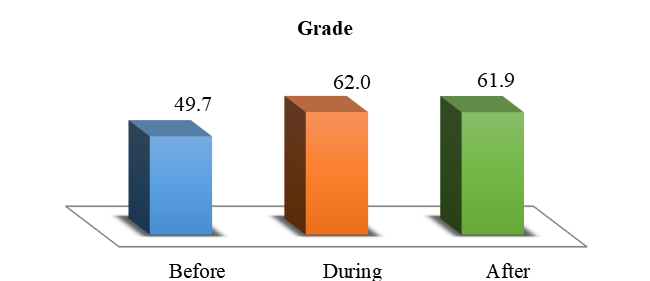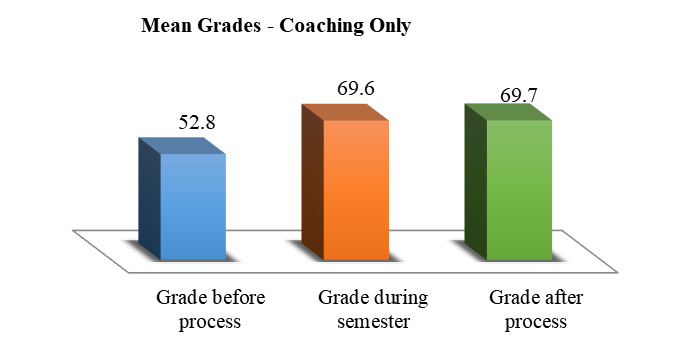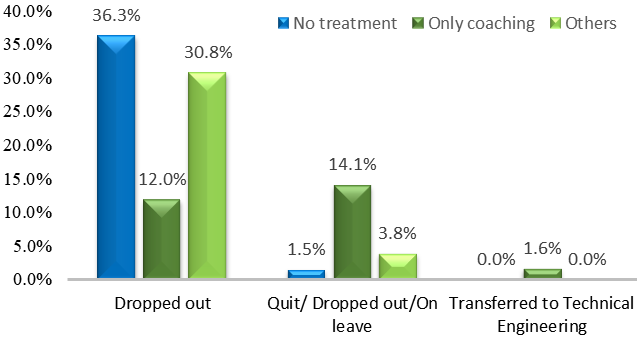Abstract
The research deals with a Personal-Academic Coaching Program based on "The Six Stages Coaching Model” for promoting students’ achievements, self-efficacy and effective learning strategies. Research literature pertaining to this research relies on Positive Psychology (
Keywords:
Introduction
Owing to the number of failures during the first year of engineering studies, Ort Braude College of Engineering in Israel has developed a unique program to promote students' academic achievements. The program is implemented at the end of the first year of engineering studies. The personal-academic coaching program was developed in order to provide students with the tools for enhancing self-efficacy, improving their self-image and building personal-academic resilience. In this process, 24 lecturers in the College were trained for personal-academic coaching by experts of the "Meamnim" (Coaches) institute with an expert from the Center for Teaching and Learning, Dr. Miri Shacham. Each lecturer-coach got structured supervision during the coaching process.
The students participate in 10 – 12 coaching sessions in order to develop and maximize their potential for reaching personal and learning goals.
Theoretical Background
The personal-academic coaching program is based on Humanistic Theories ,Positive Psychology (Seligman, 2007) and cognitive-behavioural theory .
Positive Psychology with Regard to Personal Coaching
People have preconceptions about themselves. They tend to be certain that they are clever or stupid, possibly strong or weak, leaders or followers. They also have definite viewpoints about different issues in life – such as society or politics. Human behaviour is based on mental capacity, emotional well-being, and positive psychology. Personal coaching engages in one's self-perception, and research proves that when positive thinking is high, one has better chances of coping with challenging tasks and improving performance (Bartlertt, 2007). Positive psychology is the study of positive emotions, of engagement, and of meaning, the three aspects that make sense out of the scientifically unwieldy notion of "happiness". Positive psychology attempts to measure, classify, and build these three aspects of life (Seligman & Csikszentmihalyi, 2000). Positive psychology (Seligman, 2005). focuses on: (1) the study of positive
In his article, Coaching and Positive Psychology Seligman (2007), explained the importance of positive psychology as an empirical and important factor in the personal coaching processes. Different studies reveal that Positive Psychology constitutes important empiric grounds for the field of personal coaching and personal academic coaching
Self -Efficacy and Academic Self-Efficacy
An additional factor that influences human behaviour is one's sense of self-efficacy, meaning an individuals' belief in their ability to cope with a task (Bandura, 1977). Self-efficacy pertains to people knowledge and belief that they can perform specific tasks in order to reach high achievements
According to Bandura (2006), two important factors influence a person's behaviour: self-regulation and self-efficacy. Bandura maintained that one's social environment influences one's behaviour. We all know that we have expectations regarding the possible implications of our behaviour, based on our past behaviour or on the behaviour and performance of others who resemble us. The meaning is that a person can regulate the influence and direction of behaviour. The common terms for that is self-regulation, which means a person's ability to learn from his or her reciprocity with the environment, as well as that person's ability to strengthen himself/herself and direct his or her behaviour based on the goals he or she has set (Berger, 2011)
Van Dinther, Dochy & Segers (2011) explain self-efficacy in educational context and its influence on students in high education. They explain that Social Cognitive theory refers to a person's functioning, which depends on the interaction between behaviour, personal factors such as thoughts and beliefs and events that occur in one's environment (Bandura, 1977).
Personal Coaching
Coaching is mostly directed at people who seek to reach personal and professional goals and promote their life quality. In the context of the tendency to promote goals, the world of coaching offers a practical approach. The coaching profession is viewed by the media as a major growth industry. More and more individuals and organizations tend to employ professional coaches to help them reach their personal and work related goals (Grant, 2003). A coaching approach was developed in Israel by ICA (Israeli Coaching Association) based on the methodology of ICF International. The starting point of the coaching according to ICF is that the coachee is an expert on his or her life and work, is complete, resourceful and creative. Results-based coaching approach (Katz, 2011) is based on the principles of classical life coaching, and its uniqueness is in the combination of thinking and the classical results. This approach is unique because of its ability to translate ideas, feelings, values, destination and vision into measurable results and strategy and a practical action plan (Katz, 2011).
Recent Studies: Coaching and Academic Achievements
Coaching with students is often referred to as academic coaching, and is described as neither counselling nor lessons (Dansinger, 2000). Berkeley (2011) examined "academic coaching" trying to find whether academic coaching improves student responsibility, and leads to higher learning levels. The term "academic coaching" refers to a relationship between teachers and students, because it is proactive, responds to students' learning outcomes, and committed to the student's success. The teacher's role becomes less formal and more like a coach.
The main idea of academic coaching is for the lecturer to make the transition from a distanced, indifferent lecturer to a coach that is involved, initiating and directed at students' success. The most important characteristic of academic coaching is the search for and development of relationships with students. This type of relationship can me more successful in schools or small colleges where mutual acquaintance is better. Early identification of students with difficulties can provide the way to helping those who need help at the right time. Academic coaches who take the role seriously (Barkley, 2011) enable students to make progress towards positive results. This idea is based on the results of self-regulated learning (Glen, 2010). Passmore & Fillery-Travis (2011) tried to evaluate the effectiveness of this coaching. De Meuse, Dai & Lee (2009) found that coaching led to improvement of skills and task performance. Despite the law number of studies, the finding testifies to the possibility that coaching may promote behaviour change among motivated participants. Barkley (2011) sought to examine whether and how personal coaching can promote academic achievements better than other traditional teaching methods. He placed emphasis on the students' commitment to the process as a necessary factor in the success of coaching. Hodge (2014) stated that to advance and maintain change, there is a need to wait until a person is ready. For the coaching process to be effective, participants have to see the need to change behaviour before the coaching process.
The research suggests that a combination of elements in academic coaching will lead to significant change in behaviour that will ultimately produce improved results. Phan (2014) explained how academic success can be maximized, as studies show that academic success consists of four main components: (1) an individual's personal motivation to advance learning; (2) Knowledge and the ability to utilize existing environmental resources; (3) an individual's perception of self in the social-academic environment and how this perception develops personal learning; (4) an individual's effective functioning to promote success. These four components were found to influence the quality of learning. Hodge (2014) too, described ways to change learning habits and constructing learning skills, thus showing that a process of prolonged personal coaching leads to changes in learning habits.
Gap in Knowledge
There is only few researches on how coaching in the academic framework promotes self-efficacy, effective learning strategies and students' academic achievement. The available body of research on the topic is focused on high-school students or teachers. This research focuses on the unique personal- academic coaching program that was developed in an engineering college in Israel.
Research Goal
The research goal is to examine the contribution of the personal- academic coaching program to the students in the following aspects:
(1 Academic achievements
(2) Effective learning strategies
(3) Self-efficacy
This article deals with the contribution of the personal- academic coaching program to the students' academic achievements
Research Design and Methodology
This mixed methods research was conducted in an Engineering College, and the population consisted of 407 first year engineering students who had experienced difficulties in their studies. 24 lecturers-coaches participated in the research as well. At the first stage of research, the students' grades were examined at three time points: at the end of their first year of studies, at the end of the semester during which they participated in the coaching program and in the following semester.
In the next research stages, self-efficacy questionnaires will be administered to students participating in the coaching program this year, and in-depth interviews will be carried out with students who have participated in the personal academic coaching program, in order to examine the contribution of coaching as the students see it. Furthermore, in-depth interviews will be conducted with the coaches to examine their perception of the program, the processes they have undergone and how the program influenced them.
In the process of research, the mean grades of students who experienced difficulties were examined, and later their mean grades were examined at the end of the intervention semester (coaching) and the following semester.
A comparison was made among three groups of students to examine the contribution of the coaching program:
26 students who did not participate in the coaching program, but received other types of help such as mentors, a psychologist etc.
(2) 184 students who participated in the coaching program;
(3) 187 students who did not get any help at all.
Research Hypothesis
Research hypotheses with regard to academic achievements were as follows:
Personal-Academic Coaching helps Engineering students to promote their academic achievements - According to the research hypothesis, it was expected that the grades "after" will be higher than the grades "before" among all participants and in every group separately. It is especially expected that a significant difference will be found in the group that participated in the coaching program.
Research Findings – Influence of the Personal-Academic Coaching Program on Academic Achievements
Figure

The figure shows that the mean grade before the program (base grade) is only 49.7, whereas the mean grades after the coaching program – both at the end of the semester and after another semester are over 60. In fact, we can see that on average, the improvement is more than 10 points between the base grades and the target grades.
Figure

Figure
Table
The findings reveal that indeed in all three groups there have been improvements in grades. In both grades pertaining to the process (semester and the following one) there is a significant difference between the groups, whereas in the grades after the process the difference between the groups is not significant. In both grades where we found significance, a Scheffe analysis revealed that indeed
Table
The findings reveal that indeed, generally (without distinguishing help methods) a significant difference was found between the grade before and after the process. Comparison of groups reveals that
The table shows that the group of students who got no help remained with low mean academic grades even at the end of the semester (55. 56) and in the following semester (54.34).
The group of students who participated in the personal-academic coaching program and started the process with a mean base grade of 52.85 improved the mean grade and reached a higher level of 69.56, and in the following semester the mean grade was 69.72.
The group of students who got other types of help (mentor or tutoring) and started the semester with a mean grade of 53.34 managed to improve grades at the end of the semester and in the following semester, but could not reach a mean grade higher than 65, which reflects a proper academic situation.
Figure

The figure reveals that the academic studies of 12% of the students who participated in the coaching program were terminated, whereas in the other two groups the academic studies of more than 30% of the students were terminated.
Conclusion
Like Hodge (2014) who showed that personal coaching can help in introducing changes to learning habits and build academic success, the current research tried to examine whether personal coaching would help students improve their academic achievements, construct their self-efficacy and succeed in their studies.
Analysis of the findings reveals that indeed the process of personal- academic coaching influences students' grades. According to the findings of this research, students who participated in the coaching process had improved their academic achievements at the end of the process and this improvement persevered in the following semester.
This leads to the safe assumption that the improvement is neither accidental nor improvement is the result of a careful implementation of the coaching program which gives the students "tool box" for improving learning skills, enhancing self-efficacy and helping cope on their own once the semester was over and thereafter.
This finding supports the various studies that have shown that when a students' self-efficacy increases and the student believes in his/her abilities, he or she can do any task. Van Dinther, Dochy & Segers (2011) theory shows that when a student's self-efficacy is enhanced, it leads to improved academic achievements.
It is important to note that the findings show that students who had not participated in the coaching program and managed to improve their grades at the end of the semester were not able to maintain the same mean grade in the following semester and it is even more important to understand that in fact they did not improved their academic situation, as most of them did not manage to get a mean score of over 65, which represents a proper academic situation.
Furthermore, the research findings show that the rate of students who got no help and dropped out due to their poor academic state is 36%. and 91.3% of the students who participated in the coaching program succeeded.
It is also important to note that 14% of the students who participated in the coaching program quit on their own or took a semester leave. Perhaps the coaching process showed them the other possibilities and they opted for those.
The contribution of the personal-academic program will be examined later in the second stage of the research via questionnaires and personal interviews with students from the different groups.
References
- Bandura, A., (1977). Self-efficacy: Toward a unifying theory of behavioural change. Psychological Review, 84, pp. 191-215
- Bandura, A. (2006). Toward a psychology of human agency. Perspectives on Psychological Science, 1(2), 164–180
- Barkley, A. (2011). Academic coaching for enhanced learning. Nacta Journal, 51(1), 76-81
- Bartlett, J. E. (2007). Advances in coaching practices: A humanistic approach to coach and client roles. Journal of Business Research, 60(1), 91-93.
- Berger, A. (2011). Self-regulation: Brain, cognition, and development. Human Brain Development Series. (pp. 3-17). Washington, DC, US: American Psychological Association
- De Meuse, K. E, Dai, G., & Lee, R. J. (2009). Evaluating the effectiveness of executive coaching: Beyond ROI? Coaching: An International Journal of Theory, Research and Practice, 2(2), 117-134. doi:
- Dansinger, S. (2000). Academic Coaching for the Gifted Learner. (Eric Document Reproduction Service No. ED 444 278)
- Glenn, D. (2010). How students can improve by studying themselves: Researchers at CUNY's
- graduate center push 'self-regulated learning.' The Chronicle of Higher Education Feb. 7.
- Grant, A.M. (2003). The impact of life coaching on goal attainment, metacognition and mental health. Social Behaviour and Personality, 31, 253-264.
- Hodge, B. (2014). Training programs that facilitate lasting change in student academic behaviour. International Journal of Training Research, 12(3), 203-212.
- Katz, R. (2011). Coaching to Happiness, Results Focused Training and Positive Psychology. Tel Aviv: H.M. Katz Reuven.
- Passmore, J., & Fillery-Travis, A. (2011). A critical review of executive coaching research: A decade of progress and what's to come. Coaching: An International Journal of Theory, Research and Practice, 4(2), 70-88
- Phan, H. P. (2014). Maximizing academic success: Introducing the concept of optimized functioning. Education, 136(2), 439-456.
- Seligman, M. E., Steen, T. A., Park, N. & Peterson, C., (2005). Positive psychology progress: Empirical validation of interventions. American Psychologist, 60, pp.410 – 421
- Seligman, M. E. & Csikszentmihalyi, M., (2000). Positive psychology: An introduction. American Psychologist, 55, pp. 5–14
- Seligman, M. E. (2007). Coaching and positive psychology. Australian Psychologist, 42(4), pp. 266-267.
- van Dinther, M., Dochy, F., & Segers, M. (2011). Factors affecting students’ self-efficacy in higher education. Educational research review, 6(2), 95-108.
Copyright information

This work is licensed under a Creative Commons Attribution-NonCommercial-NoDerivatives 4.0 International License.
About this article
Publication Date
22 December 2016
Article Doi
eBook ISBN
978-1-80296-017-4
Publisher
Future Academy
Volume
18
Print ISBN (optional)
-
Edition Number
1st Edition
Pages
1-672
Subjects
Teacher, teacher training, teaching skills, teaching techniques, special education, children with special needs
Cite this article as:
Yehuda, M. B., Ungureanu, D., & Stan, C. (2016). The Success Connection: The Relationship Between Personal Coaching and Academic Success. In V. Chis, & I. Albulescu (Eds.), Education, Reflection, Development - ERD 2016, vol 18. European Proceedings of Social and Behavioural Sciences (pp. 324-332). Future Academy. https://doi.org/10.15405/epsbs.2016.12.41

